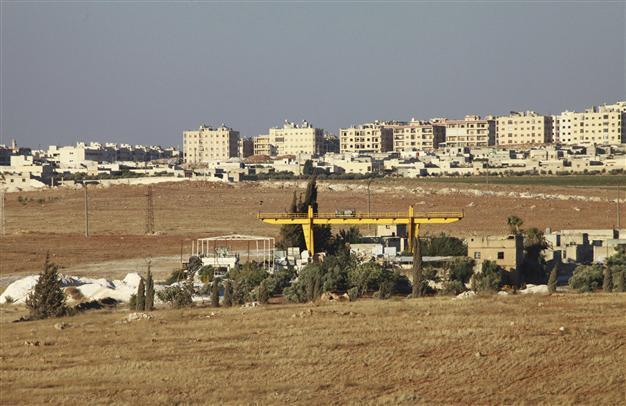UN chemical inquiry hopes hit by fall of Syrian town
UNITED NATIONS, United States - Agence France-Presse

A general view shows the outskirt of the northern town of Khan al-Assal, where forces loyal to Syria's President Bashar al-Assad are located July 22, 2013. REUTERS/Hamid Khatib
UN hopes of investigating chemical weapon attacks in Syria suffered a blow when rebels seized a key town, diplomats said ahead of talks starting Wednesday.Two senior UN inspectors tasked with examining claims that chemical weapons have been deployed in Syria's civil war arrived in Damascus on Wednesday, an AFP photographer reported.
Swedish scientist Ake Sellstrom and Angela Kane, the UN high representative for disarmament, arrived at a hotel in the Syrian capital. The pair are to hold talks with senior government officials during their two-day visit, Damascus-based UN media and communications analyst Khaled Al Masri told AFP.
Opposition fighters took Khan al-Assal from President Bashar al-Assad's forces two days ahead of the arrival in Damascus of Ake Sellstrom and Angela Kane.
Khan al-Assal was the scene of a deadly March 19 attack that the government blamed on the opposition when it called for a UN investigation.
But Britain, France and the United States have since presented evidence of other suspected chemical attacks which they blame on Assad forces. And the government has refused to let UN inspectors in unless they stick to the Khan al-Assal.
Sellstrom and Kane are to hold talks from Wednesday on securing access to Syrian territory for the investigation into all the suspected use of sarin and other banned chemical agents. "If the government does not control Khan al-Assal then there is little chance they will let UN experts in," said one UN Security Council diplomat.
"There is no opportunity for them to exploit any inquiry now," added a second council diplomat. Both diplomats spoke on condition of anonymity because the Damascus talks had not started. "But for the UN the longer this goes on the less likely it will be that there is any usable evidence to find." All the major powers now agree that chemical arms have been used in the 28 month old conflict. But the wrangling over who carried out the attacks has become a new source of division over Syria.
The United Nations said on Tuesday that details of 13 different alleged attacks have been handed over to Sellstrom's team. Apart from Khan al-Assal, there are allegations of attacks in Homs and near Damascus.
Russia has dismissed the western evidence of government use of sarin as "unconvincing". It handed over its own report on the Khan al-Assal attack last month to the UN which it said contained evidence showing the opposition carried out the attack.
But Russia gave other Security Council permanent members a version with 10 pages missing and no details of opposition involvement, according to diplomats who have read the report.
"We have yet to receive the full Russian report relating to their evidence on Khan Al Assal," one western Security Council source told AFP.Z "We believe the use of chemical weapons is sanctioned and ordered by the Assad regime: Assad built up the stocks of these weapons, trained military units to use them and retains command and control over those units. So the urgent responsibility lies with him to stop them being used," added the source.
Acting US ambassador, Rosemary DiCarlo, reaffirmed western suspicions at a Security Council meeting on the Middle East on Tuesday. "The United States assesses the regime has used chemical weapons, including the nerve agent sarin, on a small scale against the opposition, multiple times in the last year," she said.
At least 26 people are said to have been killed in Khan al-Assal in March, 16 of them Syrian soldiers.
According to the Russian version, a rebel group fired a home made missile into the town.
Britain, France and the United States say they have seen no evidence of opposition use of chemical arms.
Western diplomats suspect a government missile veered off course and killed the Assad troops. They say the government may be launching the small-scale attacks to test the international reaction. Sellstrom and Kane will hold discussions aiming to secure "on-site inspections so that there can be evidence collected on-site," said the UN spokesman Martin Nesirky.
"That doesn't mean that because an area has fallen to the rebels ... that it will not be subsequently possible to visit it," he added when asked about the fall of Khan al-Assal.
















